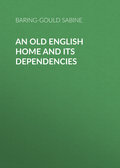
Baring-Gould Sabine
The Broom-Squire
CHAPTER XXIII
A SHOT
After Bideabout had done his business in Godalming he had returned to the Punch-Bowl.
The news had reached his ears that a deer had been seen on the Moor, and he knew that on the following day many guns would be out, as every man in Thursley was a sportsman. With characteristic cunning he resolved to forestall his fellows, go forth at night, which he might well do when the moon was full, and secure the deer for himself.
As he left the house, he encountered his sister.
"Where are you going off to?" she inquired. "And got a gun too."
He informed her of his intention.
"Ah! you'll give us some of the venison," said she.
"I'm not so sure of that," answered the Broom-Squire, churlishly.
"So you are going stag-hunting? That's purely," laughed she.
"Why not?"
"I should have thought you'd best a' gone after your own wife, and brought her home."
"She is all right – at the Ship."
"I know she is at the Ship – just where she ought not to be; just where you should not let her be."
"She'll earn a little money."
"Oh, money!" scoffed Sarah Rocliffe. "What fools men be, and set themselves up as wiser than all the world of women. You've had Iver Verstage here; you've invited him over to paint your Matabel; and here he has been, admiring her, saying soft things to her, and turnin' her head. Sometimes you've been present. Most times you've been away. And now you've sent her to the Ship, and you are off stag huntin'." Then with strident voice, the woman sang, and looked maliciously at her brother.
"Oh, it blew a pleasant gale,
As a frite under sail,
Came a-bearing to the south along the strand.
With her swelling canvas spread.
But without an ounce of lead,
And a signalling, alack t she was ill-manned."
With a laugh, and a snap of her fingers in Bideabout's face, she repeated tauntingly: —
"And a-signalling, alack I she was ill-manned."
Then she burst forth again: —
"She was named the Virgin Dove,
With a lading, all of love.
And she signalled, that for Venus (Venice) she was bound.
But a pilot who could steer.
She required, for sore her fear,
Lest without one she should chance to run aground."
"Be silent, you croaking raven," shouted the Broom-Squire. "If you think to mock me, you are wrong. I know well enough what I am about. As for that painting chap, he is gone – gone to Guildford."
"How do you know that?"
"Because the landlady said as much."
"What – to you?"
"Yes, to me."
Mrs. Rocliffe laughed mockingly.
"Oh, Bideabout," she said, "did not that open your eyes? What did Sanna Verstage mean when she asked you to allow your wife to go to the inn! What did she mean but this?" she mimicked the mistress, "'Please, Master Bideabout, may Matabel come to me for a day or two – that naughty boy of mine is away now. So don't be frightened. I know very well that if he were at the Ship you might hesitate to send Matabel there.'" Then in her own tones Sarah Rocliffe said. "That is the meaning of it. But I don't believe that he is gone."
"Sanna Verstage don't tell lies."
"If he were gone, Matabel would not be so keen to go there."
"Matabel was not keen. She did not wish to go."
"She did wish it; but she made a pretence before you that she did not."
"Hold your slanderous tongue," shouted Jonas. "I'll not hear another word."
"Then you must shut your ears to what all the parish is saying."
Thereupon she told him what she had seen, with amplifications of her own. She was glad to have the opportunity of angering or wounding her brother; of sowing discord between him and his wife.
When he parted from her, she cast after him the remark – "I believe he is still at the Ship."
In a mood the reverse of cheerful, angry with Mehetabel, raging against Iver, cursing himself, and overflowing with spite against his sister Jonas went to the Moor in quest of the strayed deer. He knew very well that his sister bore Mehetabel a grudge; he was sufficiently acquainted with her rancorous humor and unscrupulous tongue to know that what she said was not to be relied on, yet discount as he might what she had told him, he was assured that a substratum of truth lay at the bottom.
Before entering the morass Jonas halted, and leaning on his gun, considered whether he should not go to the tavern, reclaim his wife and reconduct her home, instead of going after game. But he thought that such a proceeding might be animadverted upon; he relied upon Mrs. Verstage's words, that Iver was departing to his professional work, and he was eager to secure the game for himself.
Accordingly he directed his course to the Moor, and stole along softly, listening for the least sound of the deer, and keeping his eye on the alert to observe her.
He had been crouching in a bush near the pool when he was startled by the apparition of Mehetabel.
At first he had supposed that the sound of steps proceeded from the advancing deer, for which he was on the watch, and he lay close, with his barrel loaded, and his finger on the trigger. But in place of the deer his own wife approached, indistinctly seen in the moonlight, so that he did not recognize her. And his heart stood still, numbed by panic, for he thought he saw a spirit. But as the form drew near he knew Mehetabel.
Perplexed, he remained still, to observe her further movements. Then he saw her approach the stone of Thor, strike on it with an extemporized hammer, and cry, "Save me from him! Take him away!"
Perhaps it was not unreasonable that he at once concluded that she referred to himself.
He knew that she did not love him. Instead of each day of married life drawing more closely the bonds that bound them together, it really seemed to relax such as did exist. She became colder, withdrew more into herself, shrank from his clumsy amiabilities, and kept the door of her heart resolutely shut against all intrusion. She went through her household duties perfunctorily, as might a slave for a hated master.
If she did not love him, if her married life was becoming intolerable, then it was obvious that she sought relief from it, and the only means of relief open to her lay through his death.
But there was something more that urged her on to desire this. She not merely disliked him, but loved another, and over his coffin she would leap into that other man's arms. As Karon Wyeth had aimed at and secured the death of her husband, so did Mehetabel seek deliverance from him.
Bideabout sprang from his lurking-place to check her in the midst of her invocation, and to avert the danger that menaced himself. And now he saw the very man draw nigh who had withdrawn the heart of his wife from him, and had made his home miserable; the man on behalf of whom Mehetabel had summoned supernatural aid to rid her of himself.
Kneeling behind Thor's Stone, with the steel barrel of his gun laid on the anvil, and pointed in the direction whence came Iver's voice, he waited till his rival should appear, and draw within range, that he might shoot him through the heart.
"Summon him again," he whispered.
"Iver come!" called Mehetabel.
Then through the illuminated haze, like an atmosphere of glow-worm's light, himself black against a background of shining water, appeared the young man.
Jonas had his teeth clenched; his breath hissed like the threat of a serpent, as he drew a long inspiration through them.
"You are there!" shouted Iver, joyously, and ran forward.
She felt a thrill run through the barrel, on which she had laid her hand; she saw a movement of the shoulder of Jonas, and was aware that he was preparing to fire.
Instantly she snatched the gun to her, laid the muzzle against her own side, and said: "Fire!" She spoke again. "So all will be well."
Then she cried in piercing tones, "Iver! run! run! he is here, and he seeks to kill you."
Jonas sprang to his feet with a curse, and endeavored to wrest the gun from Mehetabel's hand. But she held it fast. She clung to it with tenacity, with the whole of her strength, so that he was unable to pluck it away.
And still she cried, "Run, Iver, run; he will kill you!"
"Let go!" yelled Bideabout. He set his foot against Thor's Stone; he twisted the gun about, he turned it this way, that way, to wrench it out of her hands.
"I will not!" she gasped.
"It is loaded! It will go off!"
"I care not."
"Oh, no! so long as it shoots me."
"Send the lead into my heart!"
"Then let go. But no! the bullet is not for you. Let go, I say, or
I will brain you with the butt end, and then shoot him!"
"I will not! Kill me if you will!"
Strong, athletic, lithe in her movements, Mehetabel was a match for the small muscular Jonas. If he succeeded for a moment in twisting the gun out of her hands it was but for an instant. She had caught the barrel again at another point.
He strove to beat her knuckles against Thor's Stone, but she was too dexterous for him. By a twist she brought his hand against the block instead of her own.
With an oath he cast himself upon her, by the impact, by the weight, to throw her down. Under the burden she fell on her knees, but did not relinquish her hold on the gun. On the contrary she obtained greater power over it, and held the barrel athwart her bosom, and wove her arms around it.
Iver was hastening to her assistance. He saw that some contest was going on, but was not able to discern either with whom Mehetabel was grappling nor what was the meaning of the struggle.
In his attempt to approach, Iver was regardless where he trod. He sank over his knees in the mire, and was obliged to extricate himself before he could advance.
With difficulty, by means of oziers, he succeeded in reaching firm soil, and then, with more circumspection, he sought a way by which he might come to the help of Mehetabel.
Meanwhile, regardless of the contest of human passion, raging close by, the great bird swung like a pendulum above the mere, and its shadow swayed below it.
"Let go! I will murder you, if you do not!" hissed Jonas. "You think I will kill him. So I will, but I will kill you first."
"Iver! help!" cried Mehetabel; her strength was abandoning her.
The Broom-Squire dragged his kneeling wife forward, and then thrust her back. He held the gun by the stock and the end of the barrel. The rest was grappled by her, close to her bosom.
He sought to throw her on her face, then on her back. So only could he wrench the gun away.
"Ah, ah!" with a shout of triumph.
He had disengaged the barrel from her arm. He turned it sharply upward, to twist it out of her hold she had with the other arm.
Then – suddenly – an explosion, a flash, a report, a cry; and
Bideabout staggered back and fell.
A rush of wings.
The large bird that had vibrated above the water had been alarmed, and now flew away.
CHAPTER XXIV
THE IRON-STONE HAMMER
For a couple of minutes complete, death-like silence ensued.
Mehetabel, panting, everything swimming, turning before her eyes, remained motionless on her knees, but rested her hands on Thor's Stone, to save herself from falling on her face.
What had happened she hardly knew. The gun had been discharged, and then had fallen before her knees. Whom had it injured? What was the injury done?
She was unable to see, through the veil of tears that covered her eyes. She had not voice wherewith to speak.
Iver, moreover, stood motionless, holding to a willow. He also was ignorant of what had occurred. Was the shot aimed at him, or at Mehetabel? Who had fired?
Crouching against a bush, into which he had staggered and then collapsed, was the Broom-Squire. A sudden spasm of pain had shot through him at the flash of the gun. That he was struck he knew, to what extent injured he could not guess.
As he endeavored to raise one hand, the left, in which was the seat of pain, he became aware that his arm was stiff and powerless. He could not move his fingers.
The blood was coursing over his hand in a warm stream.
A horrible thought rushed through his brain. He was at the mercy of that woman who had invoked the Devil against him, and of the lover on whose account she had desired his death. She had called, and in part had been answered. He was wounded, and incapable of defending himself. This guilty pair would complete the work, kill him; blow out his brains, beat his head with the stock of the gun, and cast his body into the marsh.
Who would know how he came by his death? His sister was aware that he had gone to the moor to stalk deer. What evidence would be producible against this couple should they complete the work and dispose of him?
Strangely unaccountable as it may seem, yet it was so, that at the moment, rage at the thought that, should they kill him, Mehetabel and Iver would escape punishment, was the prevailing thought and predominant passion in Jonas's mind, and not by any means fear for himself. This made him disregard his pain, indifferent to his fate.
"I have still my right hand and my teeth," he said. "I will beat and tear that they may bear marks that shall awake suspicion."
But his head swam, he turned sick and faint, and became insensible.
When Jonas recovered consciousness he lay on his back, and saw faces bowed over him – that of his wife and that of Iver, the two he hated most cordially in the world, the two at least he hated to see together.
He struggled to rise and bite, like a wild beast, but was held down by Iver.
"Curse you! will you kill me so?" he yelled, snapping with his great jaws, trying to reach and rend the hands that restrained him.
"Lie still, Bideabout," said the young painter, "are you crazed? We will do you no harm. Mehetabel is binding up your arm. As far as I can make out the shot has run up it and is lodged in the shoulder."
"I care not. Let me go. You will murder me." Mehetabel had torn a strip from her skirt and was making a bandage of it.
"Jonas," she said, "pray lie quiet, or sit up and be reasonable.
I must do what I can to stay the blood."
As he began to realize that he was being attended to, and that Iver and Mehetabel had no intention to hurt him, the Broom-Squire became more composed and patient.
His brows were knit and his teeth set. He avoided looking into the faces of those who attended to him.
Presently the young painter helped him to rise, and offered his arm. This Jonas refused.
"I can walk by myself," said he, churlishly; then turning to Mehetabel, he said, with a sneer, "The devil never does aught but by halves."
"What do you mean?"
"The bullet has entered my arm and not my heart, as you desired."
"Go," she said to the young artist; "I pray you go and leave me with him. I will take him home."
Iver demurred.
"I entreat you to go," she urged. "Go to your mother. Tell her that my husband has met with an accident, and that I am called away to attend him. That is to serve as an excuse. I must, I verily must go with him. Do not say more. Do not say where this happened."
"Why not?"
She did not answer. He considered for a moment and then dimly saw that she was right.
"Iver," she said in a low tone, so that Jonas might not hear, "you should not have followed me; then this would never have happened."
"If I had not followed you he would have been your murderer,
Matabel."
Then, reluctantly, he went. But ever and anon turned to listen or to look.
When he was out of sight, then Mehetabel said to her husband, "Lean on me, and let me help you along."
"I can go by myself," he said bitterly. "I would not have his arm.
I will have none of yours. Give me my gun."
"No, Jonas, I will carry that for you."
Then he put forth his uninjured right hand, and took the kidney-iron stone from the anvil block, on which Mehetabel had left it.
"What do you want with that?" she asked.
"I may have to knock also," he answered. "Is it you alone who are allowed to have wishes?"
She said no more, but stepped along, not swiftly, cautiously, and turning at every step, to see that he was following, and that he had put his foot on substance that would support his weight.
"Why do you look at me?" he asked captiously.
"Jonas, you are in pain, and giddy with pain. You may lose your footing, and go into the water."
"So – that now is your desire?"
"I pray you," she answered, in distress, "Jonas, do not entertain such evil thoughts."
They attained a ridge of sand. She fell back and paced at his side.
Bideabout observed her out of the corners of his eyes. By the moonlight he could see how finely, nobly cut was her profile; he could see the glancing of the moon in the tears that suffused her cheeks.
"You know who shot me?" he inquired, in a low tone.
"I know nothing, Jonas, but that there was a struggle, and that during this struggle, by accident – "
"You did it."
"No, Jonas. I cannot think it."
"It was so. You touched the trigger. You knew that the piece was on full cock."
"It was altogether an accident. I knew nothing. I was conscious of nothing, save that I was trying to prevent you from committing a great crime."
"A great crime!" jeered he. "You thought only how you might save the life of your love."
Mehetabel stood still and turned to him.
"Jonas, do not say that. You cruelly, you wrongfully misjudge me I will tell you all, if you will I never would have hidden anything from you if I had not known how you would take and use what I said. Iver and I were child friends, almost brother and sister. I always cared for him, and I think he liked me. He went away and I saw nothing of him. Then, at our wedding, he returned home; and since then I have seen him a good many times – you, yourself asked him to the Punch-Bowl, and bade me stand for him to paint. I cannot deny that I care for him, and that he likes me."
"As brother and sister?"
"No – not as brother and sister. We are children no longer. But, Jonas, I have no wish, no thought other than that he should leave Thursley, and that I should never, never, never see his face again. Of thought, of word, of act against my duty to you I am guiltless. Of thoughts, as far as I have been able to hold my thoughts in chains, of words, of acts I have nothing to reproach myself with, there have been none but what might be known to you, in a light clearer than that poured down by this moon. You will believe me, Jonas."
He looked searchingly into her beautiful, pale face – now white as snow in the moonlight. After a long pause, he answered, "I do not believe you."
"I can say no more," she spoke and sighed, and went forward.
He now lagged behind.
They stepped off the sand ridge, and were again in treacherous soil, neither land nor water, but land and water tossed together in strips and tags and tatters.
"Go on," he said. "I will step after you."
Presently she looked behind her, and saw him swinging his right hand, in which was the lump of ironstone.
"Why do you turn your head?" he asked.
"I look for you."
"Are you afraid of me?"
"I am sorry for you, Jonas."
"Sorry – because of my arm?"
"Because you are unable to believe a true woman's word."
"I do not understand you."
"No – I do not suppose you can."
Then he screamed, "No, I do not believe." He leaped forward, and struck her on the head with the nodule of iron, and felled her at his feet.
"There," said he; "with this stone you sought my death, and with it I cause yours."
Then he knelt where she lay motionless, extended, in the marsh, half out of the water, half submerged.
He gripped her by the throat, and by sheer force, with his one available arm, thrust her head under water.
The moonlight played in the ripples as they closed over her face; it surely was not water, but liquid silver, fluid diamond.
He endeavored to hold her head under the surface. She did not struggle. She did not even move. But suddenly a pang shot through him, as though he had been pierced by another bullet. The bandage about his wound gave way, and the hot blood broke forth again.
Jonas reeled back in terror, lest his consciousness should desert him, and he sank for an instant insensible, face foremost, into the water.
As it was, where he knelt, among the water-plants, they were yielding under his weight.
He scrambled away, and clung to a distorted pine on the summit of a sand-knoll.
Giddy and faint, he laid his head against the bush, and inhaled the invigorating odor of the turpentine. Gradually he recovered, and was able to stand unsupported.
Then he looked in the direction where Mehetabel lay. She had not stirred. The bare white arms were exposed and gleaming in the moonlight. The face he did not see. He shrank from looking towards it.
Then he slunk away, homewards.






